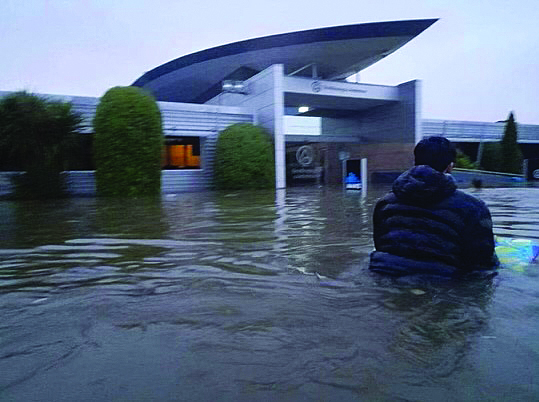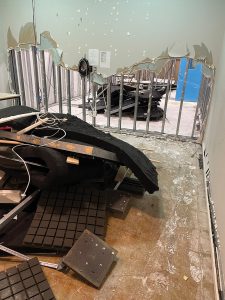Industry: MAINZ To An End
Industry: MAINZ To An End
Back in the 1990s, the tiny Greymouth-based Tai Poutini Polytechnic was offering a unique musician and audio engineering course on the South Island’s West Coast. Seeing an export opportunity TPP expanded into the big smoke, establishing the Music & Audio Institute of New Zealand, or MAINZ, a standalone tertiary music school that grew over time to be one of the best-known brands in the local music scene. Alas, no more. In April MAINZ Auckland was quietly closed down, a considerable loss to the students current and past, the city and the industry. Richard Thorne reports.
Having been asked to take over from TPP, Invercargill’s Southern Institute of Technology (SIT), has been the ‘owner-operator’ of MAINZ since 2018, and the long-distance relationship has proven a challenge for most of that time, with a state of flux and future uncertainty becoming the norm. Repeated reviews had cut staff, popular courses had been dropped, student numbers halved and visibility even further reduced. In February this year, the discussion shifted dramatically to talk of likely closure.
Emails confirming their employment termination (with due notice), sent to 12 of the remaining MAINZ academic staff in the last week of April, brought a final, sad end to their combined efforts and hopes of continuing the tertiary music school (in Auckland at least – the Christchurch campus is still operating), and the brand’s 25-plus year journey.
More than a dozen, mostly long-term MAINZ employees, had been working collectively over the last three months hoping to convince senior management of SIT and Te Pūkenga that there was a workable model that justified fresh investment, and would mean that MAINZ could continue teaching a cohort of music students for the remainder of 2023, and beyond. The redundancy emails told them that despite their best efforts they had failed.
In March and April, the group had made two lengthy submissions outlining reasons why MAINZ, which first opened in Auckland back in 1996, should remain open, and exploring ways in which that could happen. Student enquiries had been noticeably improved, and enrolment numbers were expected to increase in 2023 after the implications of Covid in previous years.
Opposing their passionate arguments were the general fiscal challenges facing the tertiary education sector (Otago University‘s recent announcement of several hundred staff redundancies being a very good case in point), largely caused by the student number decline in the post-Covid years. In MAINZ’ case throw in the acute and embarrassing shortfall of new mega-polytechnic, Te Pūkenga, which in October forecast a $63 million deficit for 2022, and signalled a need to slash $35 million from its 2023 budget.
In short, while the teachers had the passion and belief that they could make a new version of MAINZ work for their students, the SIT and Te Pūkenga executives couldn’t see the certainty of positive numbers they needed. Closure was the apparently inevitable final denouement of what has been a tragic series of administrative mis-steps and unforeseeable events over the last five years.
 As if maintaining tuition standards through Covid disruption wasn’t challenge enough, on the night of January 27 this year the new MAINZ campus in Mangere was inundated with floodwaters from the historic deluge Auckland suffered, ahead of Cyclone Gabrielle. The photo at left shows chest-deep water outside the main entrance the following day.
As if maintaining tuition standards through Covid disruption wasn’t challenge enough, on the night of January 27 this year the new MAINZ campus in Mangere was inundated with floodwaters from the historic deluge Auckland suffered, ahead of Cyclone Gabrielle. The photo at left shows chest-deep water outside the main entrance the following day.
It was a heartbreaker for the MAINZ staff and students alike to have the two-year-old campus (part of the Te Wānanga o Aotearoa Mangere campus) left unusable just days before the new academic year started. Classrooms, practice rooms and recording studios were damaged beyond easy repair, much of the electronic instruments and equipment ruined.
That flooding was by no means the start of the end for MAINZ in Auckland, but it was the start of a bravely determined rearguard action mounted by the remaining long-time academic and allied staff, seeking to find a way for MAINZ to keep on carrying on in 2023.
Almost immediately the staff began looking for alternative teaching venues and found heartening support from other businesses in and around the Auckland music scene. Zeal in Henderson was identified as a viable home for semester one tuition, with PA and events staging provider The Production Co., and venue Big Fan also offering placement options.
In mid-February, two weeks after Auckland’s flood, SIT wrote to MAINZ staff saying that it wasn’t possible to operate the planned 2023 courses in semester one, explicitly advising that the loss of about 11 full-time equivalent (FTE) academic roles may occur. With many staff working just a few days each week, losing 10.7 FTEs effectively meant the whole of the teaching team, all of whom just a few weeks earlier had themselves been preparing for classes.
‘MAINZ Auckland campus has been facing a continuous decline in the number of enrolments over the last six years and the recent flooding has had a significant impact on the functioning of the campus… ‘ the HR email told them.
‘To address these issues, we are undertaking a review to determine the financial viability of the campus. While no decisions have been made a possible outcome of the review could be the closure of the MAINZ Auckland Campus.’
Under the letterhead and logos of both SIT and Te Pūkenga the letter set a clear (if brief) timeline for both submissions and decisions, with March 10 the date given for the Executive Director’s final decision. That tight deadline was later extended to April 4 after consultation with the Tertiary Education Union.
While it may be perfectly normal for individuals to ‘fight’ to retain a job they love or need, it’s really quite something for a whole staff to fight to preserve the brand and employment they share. Group cohesion isn’t a given, and it speaks to an unusually strong shared belief that the 16 people who put their name to it so efficiently compiled the first 149-page ‘Staff Submission on MAINZ Auckland Campus Closure’, dated March 23.
The vast majority of those 149 pages were letters of support, from individuals and organisations right across the spectrum of the NZ music industry – alumni, both humbly successful and now world-renowned musicians, engineers and producers, music body representatives, high school teachers saddened for their own students’ futures, music-focused business and studio owners, venue operators, media and more.
 Addressing their concerns about a possible closure to Peter Winder, CE of Te Pūkenga, those writers were mostly singing from a very similar and coherent song sheet. Over a quarter of a century MAINZ has contributed to the local music scene in many ways, including some that are particularly pervasive.
Addressing their concerns about a possible closure to Peter Winder, CE of Te Pūkenga, those writers were mostly singing from a very similar and coherent song sheet. Over a quarter of a century MAINZ has contributed to the local music scene in many ways, including some that are particularly pervasive.
The value of support given to Māori and Pacific Island students, and the importance of tertiary foundation level courses was a common observation, as was the benefit all students accrued from learning in what had become (in the CBD Rainger House campus years) a micro industry environment, one that safely provided real-world experience while students were still studying.
“Contextualising the process of music making,” as one former tutor describes it. “The students really fed off one another, making relationships and sharing roles.”
While focusing on those creative positives, the submission also sought to explain ‘the flood of reasons’ why student numbers had declined in the years since 2018 when SIT took over running MAINZ.
‘Two staffing reviews and the closure of key programmes, including the flagship Bachelor of Audio Engineering and Production and the Diploma in Music and Event Management (level 5), have added to decreasing numbers of enrolments…’
‘This was further exacerbated by management decisions to move the campus out of a highly visible, central city location which offered opportunities for industry engagement, to Mangere, a suburb that is not well-served by public transport (2020).’
Other factors noted included the delay in building the new MAINZ campus, which necessitated online teaching ahead of Covid’s arrival, the isolation and lack of student motivation associated with the lockdowns and the subsequent invisibility of music events over two years.
Despite providing options plus many compelling letters of support, that submission evidently didn’t move the decision dial. However, the same team were given an opportunity to make another, more specific future proposal, which followed on March 29.
This 31-page document pared back any emotional or pan-industry arguments in favour of a more fundamental proposed operating model, employing academic/accounting acronyms like TTH/EFT ratio etc.
Accepting that the 2023 academic year was lost the ‘final’ submission looked forwards from a 2024 re-boot. Based on new enrolments plus returning students (and a slowly expanding course offering) it predicted a 44% increase in student numbers over three years to 2026, with a starting point of just 4.5 FTE academic roles, fewer than half those employed in early 2023.
An argument re-stated in this submission was that the closure of MAINZ Auckland would result in Te Pūkenga overseeing the loss of any music-focused tertiary learning pathways within both the Tamaki Makaurau and Te Tai Tokerau regions. That loss is not just at the cost of potential students, it is also at the very real cost of the nation’s Auckland-focused music industry. MAINZ students and graduates have become a necessary feeder service into all aspects of that typically buoyant sector, not simply the talent.
Awaiting the outcome of this submission the remaining staff learnt on April 23 that their valiant fight had been in vain, and that after a quarter century of teaching music to students who relished and benefitted from the practical, hands-on polytechnic learning approach, MAINZ Auckland has sadly come to an end.

